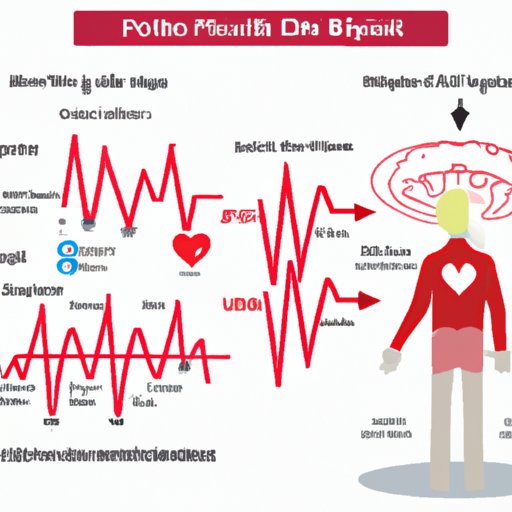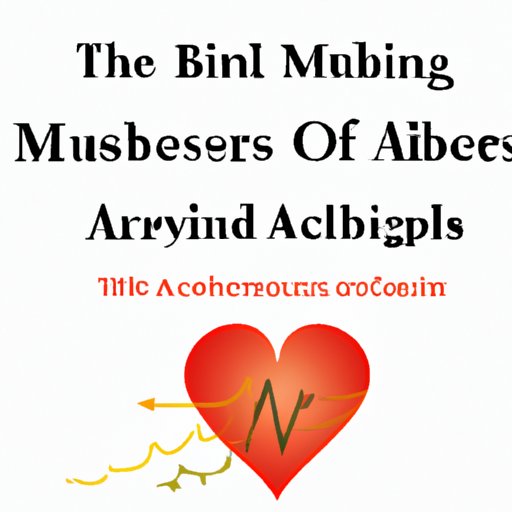
Introduction
Atrial fibrillation, commonly referred to as Afib, is a heart condition that affects nearly 6 million people in the United States alone. It occurs when the heart’s rhythm becomes irregular, leading to poor blood flow and increased risk of stroke and other heart-related complications. Identifying Afib symptoms early is crucial in managing this condition. In this article, we will provide a comprehensive guide to understanding Afib symptoms.

Unraveling the Mystery of Afib Symptoms: A Comprehensive Guide
Individuals with Afib may experience a wide range of symptoms, some of which are common and others that are less frequent. The following are some of the most prevalent Afib symptoms.
Common Symptoms
Palpitations, or the feeling of a rapid and irregular heartbeat, are one of the most common Afib symptoms. Many people describe it as a fluttering or pounding sensation in their chest. Shortness of breath is also common, especially during physical activity. Individuals with Afib may experience fatigue, particularly if the condition is left untreated. Other symptoms may include weakness, lightheadedness, and difficulty exercising.
Less Common Symptoms
Although less common, Afib can also cause chest pain and discomfort. Some people may also experience dizziness or fainting spells. These symptoms are usually more prevalent in older individuals or those with pre-existing heart conditions.
Variability of Symptoms
It is essential to note that Afib symptoms can vary from person to person. Some individuals may experience only a few of the symptoms mentioned above, while others may have a combination of several. The severity of symptoms can also vary, depending on how fast the heart is beating and how long the Afib episode has lasted.
The Telltale Signs of Afib: Understanding the Symptoms
The following are some specific signs that can indicate the presence of Afib:
Irregular Heartbeat
One of the primary indicators of Afib is an irregular heartbeat. The heart rate may be too fast or too slow, and the rhythm may be erratic. Some people with Afib may feel as though their heart is racing or skipping a beat.
Fluttering in the Chest
Many individuals with Afib report feeling a fluttering sensation in their chest. This may occur during or after physical activity or at rest. It can last anywhere from a few seconds to several hours.
Other Signs and Symptoms to Watch Out For
Other symptoms that may occur include chest pain or discomfort, shortness of breath, fatigue, weakness, lightheadedness, and fainting spells. It is important to seek medical attention if you experience any of these symptoms.
Afib Symptoms: How to Spot Them and What to Do Next
If you suspect you may have Afib, the following are some steps you can take:
Schedule an Appointment with Your Doctor
The first step in diagnosing Afib is to consult with a medical professional. Your doctor will likely perform a physical exam and may order diagnostic tests, such as an electrocardiogram (ECG) or a Holter monitor to record your heart’s activity.
Diagnosing Afib
If your doctor suspects you have Afib, they may refer you to a specialist, such as an electrophysiologist. This specialist focuses on diagnosing and treating heart rhythm disorders and may order additional tests, such as an echocardiogram or a tilt table test, to confirm the diagnosis.
Living With Afib: Recognizing and Managing the Symptoms
Although Afib is a chronic condition, there are ways to manage symptoms. The following are some tips for managing Afib symptoms:
Stay Hydrated
Drinking plenty of water and other fluids can help prevent dehydration, which can exacerbate Afib symptoms.
Get Enough Rest
Getting enough sleep is essential for managing Afib symptoms. It is important to establish a regular sleep schedule and avoid staying up too late or oversleeping.
Lifestyle Changes
Making lifestyle changes, such as exercising regularly, reducing stress, and quitting smoking, can also help manage Afib symptoms. Your doctor may recommend a specific exercise plan or stress management techniques.
From Irregular Heartbeats to Fatigue: The Different Afib Symptoms to Watch Out For
In addition to the symptoms listed above, Afib can also cause other health issues, including an increased risk of stroke, heart failure, and other complications. Recognizing the signs of Afib and seeking medical attention can help prevent these complications.
When Symptoms are More Severe
If your Afib symptoms are severe or if you experience sudden chest pain, shortness of breath, or difficulty breathing, seek immediate medical attention. These symptoms can indicate a more serious underlying condition that requires urgent treatment.
Afib Symptoms: A Closer Look at What it Feels Like to Have Atrial Fibrillation
Many individuals with Afib report feeling anxious and worried about their condition. Others may feel frustrated or angry that they have to deal with the condition. Hearing from others who have experienced Afib symptoms can help you feel less alone and more empowered to manage your condition.
Personal Stories
Over the years, many individuals have shared their personal stories of living with Afib. These stories provide valuable insights into how others have coped with the condition and offer tips for managing Afib symptoms.
Conclusion
In conclusion, recognizing and understanding Afib symptoms is essential for managing this condition. If you suspect you have any of the symptoms listed above, be sure to consult with your doctor. By taking steps to manage your Afib symptoms, you can live a healthy and fulfilling life despite this chronic condition.





